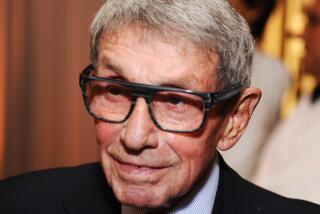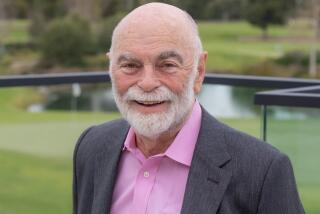Top Agent Talks About Decision to Quit
- Share via
If you think being a top Hollywood agent is always glamorous, think again. Yes, the salaries and perks can be enormous. And getting thanked by a client at the Academy Awards, in front of some 1 billion TV viewers, must be very gratifying.
But those benefits go hand in hand with a daily grind and unrelenting stress that few are willing to discuss publicly.
“It’s like swimming in the ocean. You go through one set of waves, and you can rest for 30 seconds until the next set of waves comes up and you have to negotiate those. But you don’t get any credit for having gone through the first set,” says Creative Artists Agency’s Jane Sindell, who is bowing out of agenting after 22 years while at the height of her career representing some of Hollywood’s hottest writers and directors.
Agenting is a demanding business that can burn out even the profession’s toughest practitioners. Historically, many prominent agents have left the field at the top of their game, including Sindell’s own former bosses, CAA founders Michael Ovitz and Ron Meyer. Ovitz and Meyer went into the executive ranks and their co-founding partner Bill Haber joined a charitable organization.
Yet unlike the executive track at studios, where musical chairs is the norm, agenting can be a career-long profession for many.
After earning a reputation as one of Hollywood’s smartest and most decent agents, Sindell, 44, says she wants to take a breather before landing a job that can bring her closer to the creative process.
Sindell is regarded as one of the top literary agents in the business, having worked at all three of Hollywood’s major talent houses--CAA, International Creative Management and William Morris. Over the years she has represented such screenwriter clients as Gary Ross (“Big”) and Eric Roth (“Forrest Gump”); directors Barry Levinson, Michael Apted and Alan Parker; and actors Billy Crystal and Paul Newman.
Her decision to leave the agency business has surprised many in the industry. She is one of several senior female agents to depart CAA in recent years, sparking the question among some insiders about whether sexism may have played a part. No female agents were asked to be part of the new owner-management team that took over CAA when Ovitz, Meyer and Haber left about two years ago.
But Sindell, who was at CAA for 11 years and ran the agency’s motion picture literary department for the last six, bristled at the suggestion. She said she “never experienced any gender issues” at any time in her long career, even in starting out as a secretary at William Morris at a time when women weren’t allowed in the mail room training program.
“It never occurred to me I wouldn’t succeed,” Sindell said.
In leaving the agency business, Sindell breaks with a family tradition of sorts.
*
A native of Los Angeles, she was born into the business through a long line of agents and a mother who worked as Herman Mankiewicz’s secretary when he wrote the 1941 classic “Citizen Kane.” She recalls reading her first script when she was 8, and claims to be “the only 10-year-old kid I knew who sat through the credits” of every movie she saw. Her uncle, Sam Jaffe, now 96, began his own agency in 1935, representing the likes of Errol Flynn and Humphrey Bogart. That spawned her late father Bernard’s own successful firm, the Sindell Agency, in 1955, as well as her uncle Phil’s business, the Gersh Agency. Her older brother, Richard, runs his own talent agency in Los Angeles.
But for Sindell, more than 20 years of “constant pressure” was enough reason to seek a new challenge.
“Having done this as long as I’ve done it, the process became somewhat monotonous . . . somewhat predictable,” Sindell said in a rare interview. “No matter what you’ve accomplished for a specific client, there’s a never-ending sense of not doing enough.”
Sindell is leaving as the profession, reflecting the industry at large, has become increasingly cutthroat and competitive. Agents openly admit they often spend more time fending off rivals than procuring jobs for clients.
“It’s a shame that we’re all forced to be in a kind of proactive defensive mode,” Sindell said. “I think the stakes are higher, so everything’s ratcheted up.”
On the positive side, Sindell said that over the last two decades the agent’s role has widened considerably to include such things as input on marketing a client’s film or helping a client branch into other creative areas.
“I think the expectations of what an agent should do, can do and is expected to do are greater today,” said Sindell, crediting Ovitz and Meyer for raising the bar.
But with those growing expectations comes added pressures.
Sindell said her career “has been unbelievably great” but that “having to be accountable to clients and associates on a daily, monthly and yearly basis” finally got to her.
“I just felt I was responsible for people’s livelihoods, in a broader sense, and it just becomes daunting after 20 years,” she said.
“I don’t want to be over-dramatic, but it means basically having to put food on someone’s table. And even though someone is doing well economically, it’s about getting their movies made, getting them marketed properly, getting them positioned the way the artist wants them positioned. It’s having to be absolutely on top of information before your competitor is. . . . It’s the feeling of knowing even though you’ve done a good job, that there are a lot of circumstances beyond an agent’s control that can make you vulnerable with a client.”
Sindell added, “While you’re ramping up 100% of your energies to get that movie made during a critical time, under intense pressure, you have to find another 100% of your energy that can be spent on your other business.”
To her peers and clients, Sindell always managed.
Fellow CAA agent Robert Bookman describes her as “the rock of Gibraltar.”
Longtime screenwriter client Gary Ross agrees, saying, “She’s the calmest person in a crisis.” He recalls the time Warner Bros. was concerned that his movie “Dave” might not open well.
“Jane kept saying, ‘It’s a great movie, it will do fine.’ . . . She brought a lot of humanity to her job,” Ross said. “What made Jane great as an agent, always having distance and perspective, was what made her realize she didn’t want to be an agent when she began to get tired of it.”
Associates describe Sindell as the most atypical of Hollywood. She’s anything but slick and dresses more like a college professor than an agent. She says if she cared about the status symbols and trappings others in Hollywood covet, “I don’t think I’d still have my house in Cheviot Hills.”
Studio executives say in a profession where honesty and directness don’t always tend to be virtues, Sindell stands out.
“She’s so classy, and you never felt like you were being hustled,” says Amy Pascal, president of Columbia Pictures. “Unlike most conversations you have all day long, talking to Jane is like talking to a real person.”
*
Married to TV writer David Hurwitz for 11 years, Sindell believes that maintaining perspective and a personal life is what kept her sane. She’s not someone who goes out five nights a week for business dinners or attends every A-list party so she’ll be seen.
Sindell said she tried hard to follow in the footsteps of her father, who taught her the importance of returning every phone call and who “was home with us pretty much every night.”
She says her parents hoped she would stay away from the entertainment business. “They didn’t feel that it was the most appropriate, decent business for a nice Jewish girl like me growing up in Westwood.”
Sindell studied at Stanford University and was headed for a career in clinical psychology until she realized the movie business was her destiny. She spent her senior year at college as a film major and landed her first industry job as a floater secretary at William Morris in 1975. She became a TV literary agent after 2 1/2 years, after “a lot of finagling and political support,” leaving in 1980 when Jeff Berg, head of International Creative Management, “gave me a very big break” and hired her in the motion picture department.
Six years later, CAA courted her and “helped me grow tremendously by exposing me to artists I never would have otherwise worked with,” including Kevin Costner and Oscar-winning director Sydney Pollack.
Sindell said her decision to leave agenting was made after years of introspection. “I knew if I woke up 20 years from now and had done nothing my whole life other than having been an agent, I would be disappointed in myself.”
More to Read
The biggest entertainment stories
Get our big stories about Hollywood, film, television, music, arts, culture and more right in your inbox as soon as they publish.
You may occasionally receive promotional content from the Los Angeles Times.










